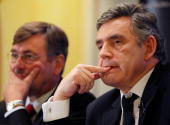 Brown’s delivery may have been beyond sepulchral, but the content was encouraging. He laid out how Afghan stability is being bolstered by the increased activity and competence of Afghan security forces, the replacement of the heroin crop with wheat, an intensification of government in rural hinterlands and by arresting urban corruption.
Brown’s delivery may have been beyond sepulchral, but the content was encouraging. He laid out how Afghan stability is being bolstered by the increased activity and competence of Afghan security forces, the replacement of the heroin crop with wheat, an intensification of government in rural hinterlands and by arresting urban corruption.
At least there now seems to be a degree of co-ordination between coalition and Afghan security operations, civic reconstruction and the administration of government. These are welcome changes but there is still no overarching sense of what the ‘Afghan mission’ hopes to achieve, beyond the dubious contention that it will make the West safer. As a result, a number of the initiatives Brown articulated are ill-focussed or counter-productive.
It is clear that non-jihadist elements of the Taliban are fighting to resist foreign aggressors and the encroachments made on their patrimonies by what is perceived as a puppet regime in Kabul. Strengthening the centre’s grip over localities, through a variety of military, civil and judicial means, will only exacerbate this strain of insurgency.
NATO’s insistence on pursuing this hands-on policy underlines the flaw in its strategic thinking: it assumes that Afghan warlords and ordinary Afghans have a sense of nationhood and believe they can take their stake in that nation. The non-jihadist insurgency of potentates, intent on protecting from the interference of Kabul, is a narrative extending back to at least 1989. That this insurgency intensified as NATO increased its efforts to secure the country so that Kabul might govern is no surprise.
NATO cannot defeat the Taliban’s diverse insurgencies outright, and I’ve expressed doubts about remaining committed to this rudderless mission before. But if NATO is to drive out the jihadists and secure and develop Afghanistan, it must acknowledge the reality of Afghan political society and, in the short-term, look not to Kabul for stability, but to the warlords.






Comments